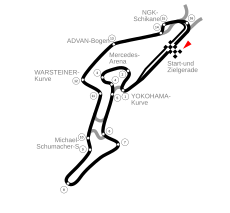Nordschleife
 
|
|
| Location | Coordinates: 50°20′08″N 6°56′51″E / 50.33556°N 6.94750°E |
|---|---|
| Time zone | GMT +1 (DST: +2) |
| FIA Grade | 1 |
| Major events |
FIA Formula One German Grand Prix European Grand Prix Luxembourg Grand Prix Superbike World Championship, DTM, 24 Hours Nürburgring, 1000km Nürburgring, VLN |
| GP-Strecke (2002–present) | |
| Surface | Asphalt |
| Length | 5.148 km (3.199 mi) |
| Turns | 16 |
| Lap record | 1:29.468 ( |
| GP-Strecke (1984–2001) | |
| Surface | Asphalt |
| Length | 4.556 km (2.831 mi) |
| Turns | 12 |
| Lap record | 1:18.354 ( |
| Nordschleife (1983–present) | |
| Surface | Asphalt/concrete |
| Length | 20.81 km (12.93 mi) |
| Turns | 154 |
| Lap record | 6:11.13 ( |
| Combined circuit (1984–present) | |
| Surface | Asphalt/concrete |
| Length | 25.947 km (16.123 mi) |
| Turns | 170 |
| Lap record | 8:10.921 ( |
| Nordschleife (1927–1982) | |
| Surface | Asphalt/Concrete |
| Length | 22.8 km (14.2 mi) |
| Turns | 160 |
| Lap record | 7:06.4 ( |
| Südschleife (1927–1973) | |
| Surface | Asphalt |
| Length | 7.747 km (4.814 mi) |
| Turns | 27 |
| Lap record | 2:44.0 ( |
| Gesamtstrecke (1927–1982) | |
| Surface | Asphalt |
| Length | 28.265 km (17.563 mi) |
| Turns | 187 |
| Lap record | 15:06.1 ( |
Nürburgring is a 150,000-capacity motorsports complex located in the town of Nürburg, Rhineland-Palatinate, Germany. It features a Grand Prix race track built in 1984, and a much longer old "North loop" track which was built in the 1920s around the village and medieval castle of Nürburg in the Eifel mountains. The north loop is 20.8 km (12.9 mi) long and has more than 300 metres (1,000 feet) of elevation change from its lowest to highest points. Jackie Stewart nicknamed the old track "The Green Hell".
Originally, the track featured four configurations: the 28.265 km (17.563 mi)-long Gesamtstrecke ("Whole Course"), which in turn consisted of the 22.810 km (14.173 mi) Nordschleife ("North Loop"), and the 7.747 km (4.814 mi) Südschleife ("South Loop"). There also was a 2.281 km (1.417 mi) warm-up loop called Zielschleife ("Finish Loop") or Betonschleife ("Concrete Loop"), around the pit area.
Between 1982 and 1983 the start/finish area was demolished to create a new GP-Strecke, and this is used for all major and international racing events. However, the shortened Nordschleife is still in use for racing, testing and public access.
In the early 1920s, ADAC Eifelrennen races were held on public roads in the Eifel mountains. This was soon recognised as impractical and dangerous. The construction of a dedicated race track was proposed, following the examples of Italy's Monza and Targa Florio courses, and Berlin's AVUS, yet with a different character. The layout of the circuit in the mountains was similar to the Targa Florio event, one of the most important motor races at that time. The original Nürburgring was to be a showcase for German automotive engineering and racing talent. Construction of the track, designed by the Eichler Architekturbüro from Ravensburg (led by architect Gustav Eichler), began in September 1925.
...
Wikipedia
